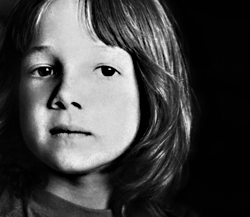Noted boomer autobiographer and film critic Phillip Lopate elected the documentary Following Sean as his best undistributed film of 2005, and it’s easy to see why. It’s a fascinating ’60s flashback in the manner of Michael Apted’s Seven Up movies, and meditative in just the way Lopate’s prose work is.
The star is Sean Farrell, who was 4 when director Ralph Arlyck met him in 1969 San Francisco. Sean’s hippie dropout family lived upstairs from Arlyck in the Haight. Arlyck made a 15-minute film of his interview with the mediagenic toddler, who trotted the scummy streets barefoot (because shoes were “creepy”) and casually admitted that he’d smoked and eaten pot.
This money quote launched Arlyck’s filmmaking and teaching career, saving him from a sad life as an alternative journalist at the San Francisco Bay Guardian. The White House screened his film as a warning to parents; the Beatles chose it to show before Yellow Submarine. Now Arlyck’s camera follows Sean again. Unlike Apted, he includes his own life and family in the film, as well as Sean’s extended family.
Oddly, he doesn’t include Sean’s recent confession that he hadn’t really tried pot as a tot. But Sean definitely risked the hippie lifestyle: His dad, Johnny, was a hard-core flower child, who shirked straight jobs and pressured his teenage wife to tolerate open marriage. Sean’s long-divorced mom seems at peace with youthful folly; Johnny is exactly the same, only frailer, grayer, and balder.
Sean took after his remarkably handy dad, who built a $500,000 house (and gave it to his ex-wife in exchange for no responsibilities). Sean did well at Berkeley and plans, at 41, to go to law school, even though he makes about $97,000 as a San Francisco union electrician. He also proudly takes after his grandpa, a famous Commie union organizer whose run-ins with authority enliven the film. His high-gumption grandma got a settlement from his grandpa’s asbestos-caused death and spent it on a hot tub with the inscription “Nothing is too good for the working man.”
Sean has an affectionate, eye-rolling disapproval of his dad’s defiant self- seeking and fiscal folly. We see Sean marry an ambitious Russian immigrant, then have an adored son, then divorce. This parallels the rather self-actualizing filmmaker’s marriage to a French academic who spends years teaching abroad while he stays in Poughkeepsie, N.Y. Love is risky; transcultural love is worse, though in some cases worth it.
Following Sean isn’t as shapely and satisfying as Apted’s flicks, but Sean is a thoughtful, interesting guy to spend 88 minutes with. It’s interesting to consider whether his life is better than his dad’s: Sean is more sensibly responsible, but his dad seems slightly happier in his absolute independence. The film partly answers David Crosby’s old command: Find the cost of freedom. (NR)








